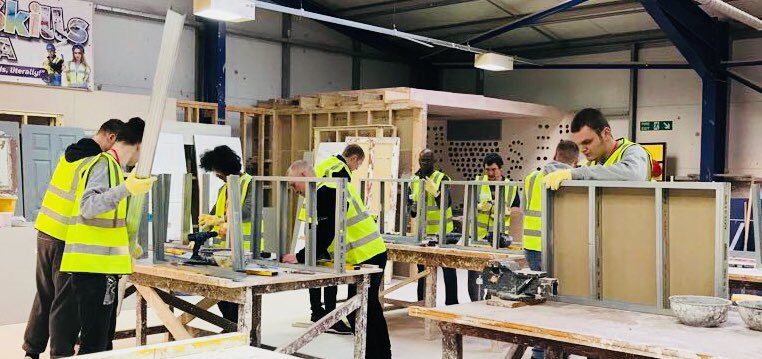The successful FIS BuildBack programme is back to help recruit new workers.
The drylining sector needs to recruit at least 2,000 new entrants each year and that is without factoring in the potential loss of EU workers in a tightened immigration system. To help hit these
numbers FIS BuildBack is set to make a welcome return in 2021.
FIS Skills and Training Lead, George Swann, commented: “We are happy and keen to get going again with BuildBack because, pre-COVID, it was having an effect, and the sector needs it to attract new people.
As well as a targeted recruitment service, BuildBack provides a structured assessment and induction process for employers that helps to encourage the right individuals into the finishes and interiors sector and ensure money spent on training is invested with minimal waste.”
What is BuildBack
BuildBack is a collaborative initiative that connects employers, funding and candidates to fi nd the next generation of dryliners. At the start of 2020, BuildBack activity with the Department for Work and Pensions (DWP) was delivering a best in class 64% employment rate.
The project was put on hold due to the COVID-19 pandemic, but thanks to renewed support from the Construction Industry Training Board (CITB), the DWP and charitable organisations like Building Heroes and YouthBuild, BuildBack will restart in the New Year.
Anne Pavey, Senior National Account Manager at DWP, said: “We are delighted to be working with FIS again on BuildBack. The concept is simple and effective, delivering tangible results for employers and candidates.
“The engagement levels we have enjoyed with the sector are encouraging and BuildBack supports the candidates to enter the industry and it’s a great stepping stone on their path to a career in construction.”
How BuildBack works
The FIS team works with groups of employers across the UK to identify opportunities in a region and then, working with the DWP or charities targeting employment, looks to build a BuildBack cohort.
STEP 1: Set-up – establish the need and work in a region to recruit candidates for an assessment day and line up potential employers;
STEP 2: Assessment – put candidates through a specialist assessment programme to ascertain suitability for work in the trade;
STEP 3: Training – a specialist appliedtraining programme, carried out by an FIS approved training provider, for two weeks, covering the skills and competencies required for installing drylining. Training takes place in training centres in hubs, on a construction site, or while working for a charity;
STEP 4: Work trial – successful candidates are funded to take their H&S test, issued with a provisional CSCS card, provided with PPE and a basic toolkit before being placed with an employer for their two-week work-experience; and
STEP 5: Employment – candidate is taken on and ideally is considered for starting their vocational qualifi cation or apprenticeship. FIS continues to monitor the progress of individuals.
So far, 660 candidates have been through training and 420 went on to employment through BuildBack.
Benefits of BuildBack to businesses
The skills shortages brought about by Brexit will have particular impact on the drylining sector, as it is heavily reliant on EU workers. It is therefore imperative that employers future-proof their workforce by training new entrants.
BuildBack helps employers to boost their workforce by providing a pool of candidates with a grounding in the skills and competencies required for installing drylining. Employers can meet and select the candidates they want to offer work experience to, to ensure they are best fit for the organisation.
Once employed, FIS can support future training and the achievement of a vocational qualification or an apprenticeship, through its training provider network.


